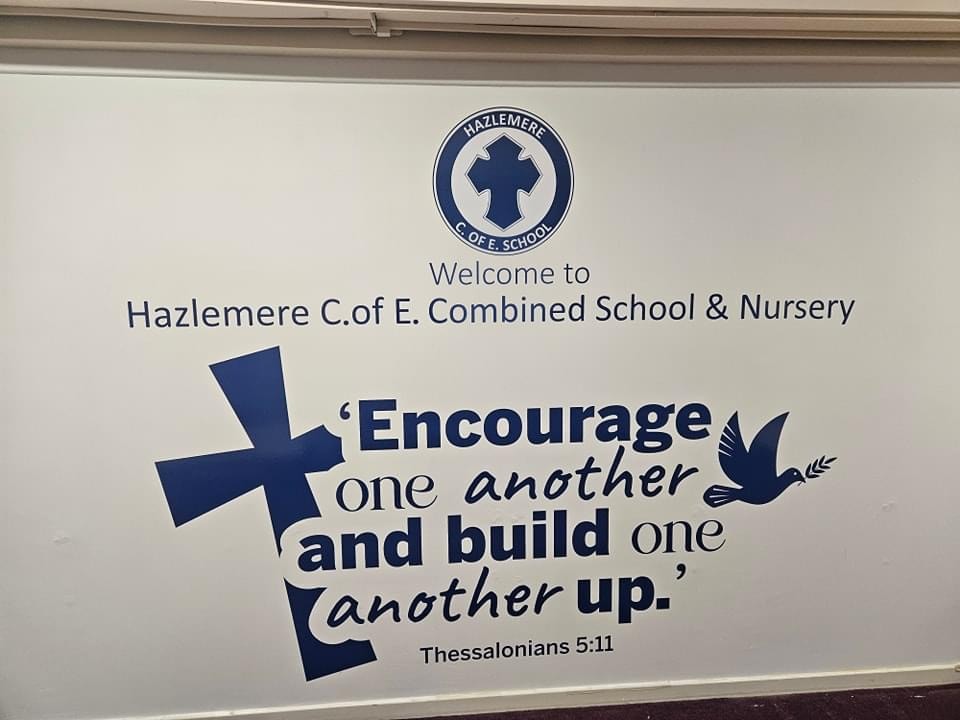Religious Education
 'Encourage one another and build one another up'
'Encourage one another and build one another up'
Our Theologically-Rooted Christian Vision of our staff, governors and all involved in our school, is that we uplift and support each other to be the best versions of ourselves; to enable one another to flourish and to use our talents to serve and praise God.
We have 6 school values and each one is underpinned by the Christian faith. We see each of our 6 values as pillars that support our vision, 'encourage one another and build one another up'.
We focus on one particular value per half-term, teaching children stories from the bible linked to each particular value and encouraging them to find ways to show that value both in school and at home.

The Religious Education Syllabus
The RE curriculum is intrinsic to the school’s Christian vision and in enabling all pupils to flourish. In addition, the RE curriculum will contribute to British values and spiritual, moral, social and cultural development. Learning activities focus on the needs of all pupils. Pupils develop a wide range of skills including enquiry, analysis, interpretation, evaluation and reflection. Pupils have a safe space to explore their own religious, spiritual and/or philosophical ways of seeing, living and thinking, believing and belonging. Opportunities are provided to engage in meaningful and informed dialogue with those of all religions and world views.
Intent
At Hazlemere Church of England School, our aim is to develop curiosity and spirituality in pupils and equip them for future learning about, as well as enabling them to make sense of, the complex world of religious and non-religious worldviews.
Pupils will have the opportunity to explore the wider concept of what a worldview is and how people reach these ideas. We aim to provide our children with religious literacy where they will develop their knowledge and understanding of Christianity, other religious traditions and worldviews and explore their responses to life's challenges. This gives pupils the knowledge and skills to flourish both within their own community and as members of a diverse and global society.
The purpose of RE is to teach children about the religious and non-religious worldviews that they will encounter in modern Britain and enable them to engage in meaningful and considered dialogue with those of all faiths and worldviews. Through the teaching of Religious Education, children will:
- Know about and understand Christianity as a diverse global living faith through the exploration of core beliefs using an approach that critically engages with biblical text.
- Gain knwledge and understanding of a range of religions and worldviews appreciating diversity, continuity and change within the religions and worldviews being studied.
- Engage with challenging questins of meaning and purpose raised by human existence and experience.
- Recgnise the concept of religion and its continuing influence on Britain’s cultural heritage and in the lives of individuals and societies in different times, cultures and places.
- T explore their own religious, spiritual and philosophical ways of living, believing and thinking.
Implementation
At Hazlemere Church of England School, we have created our own curriculum using a variety of sources, including the Buckinghamshire Syllabus (2017), the Oxford Diocese scheme of work (2019) and Understanding Christianity resources. Our curriculum offers a broad and balanced enquiry into a range of religions and world views.
Throughout each unit every half-term, the children will be presented with an enquiry question. They may start by exploring and identifying their own meaning to the question by reflecting on their own experiences and self-concepts. Children will then have the opportunity to investigate, reflect and respond to different religions or worldviews responses to the question, before applying this by giving an informed and justified response to the enquiry question.
Across the school, all year groups will cover three units with a Christianity focus (at least 50% of the RE curriculum). Key concepts will be revisited on a spiral curriculum. Children will then explore further one other religion and/or worldview;
- Key Stage 1 – Judaism
- Lower Key Stage 2 – Hinduism
- Upper Key Stage 2 – Islam and Humanism
In the Early Years Foundation Stage (EYFS), learning is pupil-initiated and children encounter a range of traditions and world views. This includes specific planned activities (e.g. on festivals, special places) for developing children’s knowledge and understanding of religious beliefs (e.g. through circle time, show and tell and story-time, as well as unplanned, child-initiated opportunities and every day routines).
At Hazlemere Church of England School, we value all religious and non-religious views and therefore the children have the opportunity to explore beliefs through carefully planned visits, visitors, assemblies and specialist days.
Impact
All pupils will leave Hazlemere Church of England School, equipped with the knowledge and skills to flourish both within their own community and as members of a diverse and global society. A fostered sense of curiosity and spirituality in all pupils will equip them for future learning about, as well as enabling them to make sense of, the complex world of religious and non-religious worldviews. Pupils will have a safe space to explore their own religious, spiritual and/or philosophical ways of seeing, living and thinking. Built upon their foundational knowledge, children will develop their disciplinary skills; in order to question, analyse, and evaluate the world around them. Pupils will be able to appreciate and celebrate diversity, recognising beliefs, values and practices in common and maintaining a respect for shared human values that can be experienced, expressed and responded to in diverse ways.
Godly Play
Godly Play: Making meaning through story, wonder, and play.
Godly play is the telling of Bible stories that allows children to explore their own spirituality, and to seek and find their own answers to questions about faith, God, themselves and the world.
Every Wednesday afternoon, Mrs Cook delivers a Godly Play session to a class on rotation. Take a look at our gallery to see what Godly Play entails.
"We have been sharing the story of Esther. We heard about how she was a Jewish girl who lived with her Uncle Mordecai and was then chosen to be Queen of Persia. She kept her Jewish identity a secret as some people did not like the Jews. The king had a trusted servant called Haman. He hatched a plan to have all the Jews killed on a certain date. Mordecai told Esther that she needed to tell the king about her people in order to save them. She knew that she could be killed for doing so but she was brave and the King loved her so instead he had Haman killed.
Esther was responsible for saving all of her people as she was brave and trusted God.
The story links to our value this half term which is ambition.
In our sessions we listen to a Bible story, enjoy some craft activities together and then share a snack and our news."
